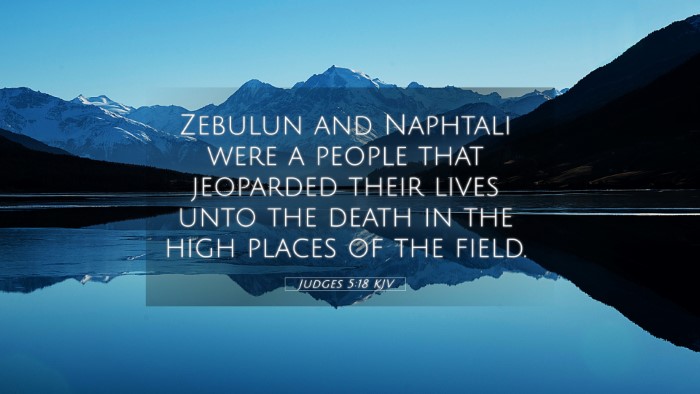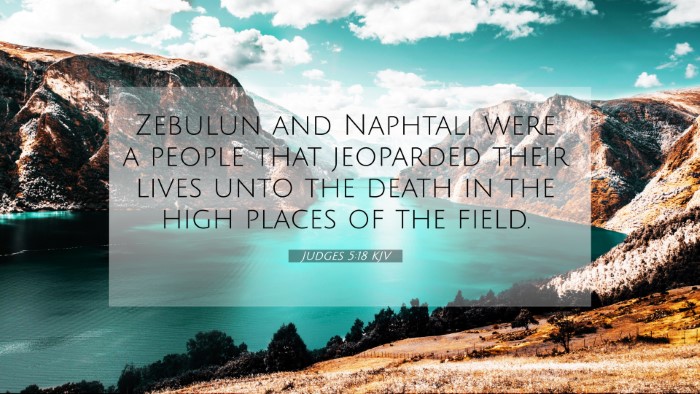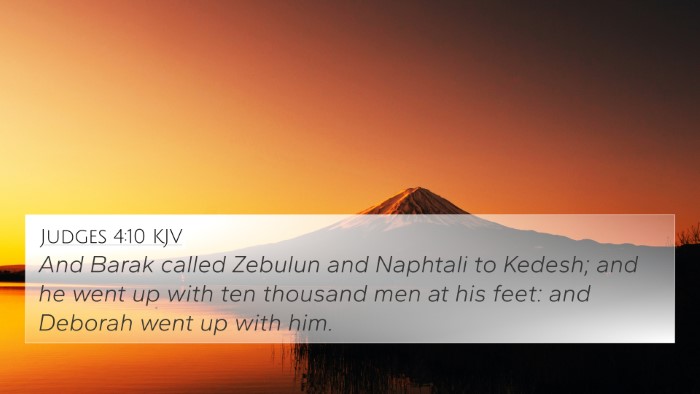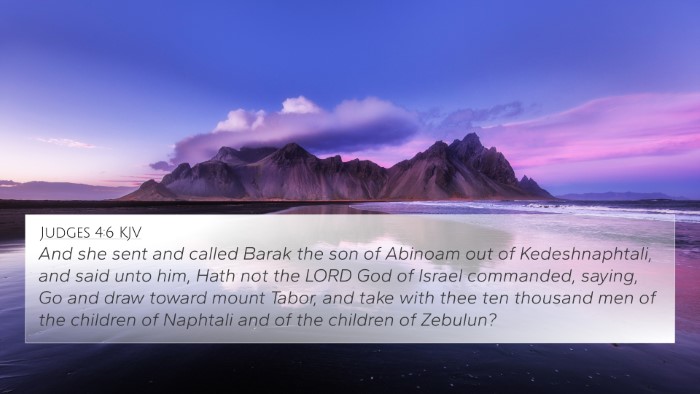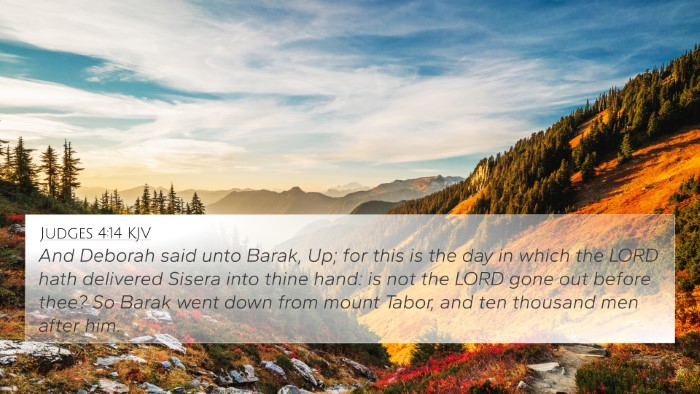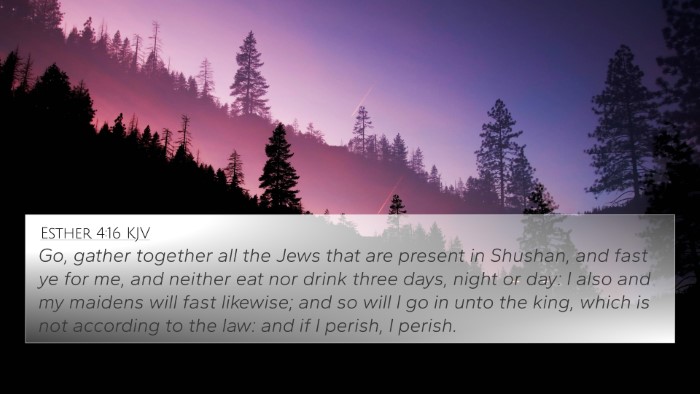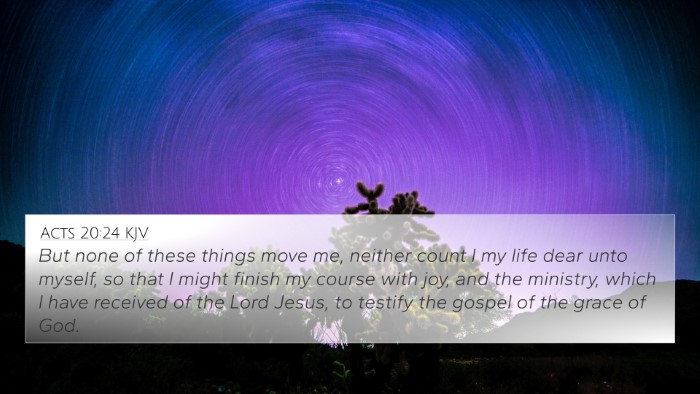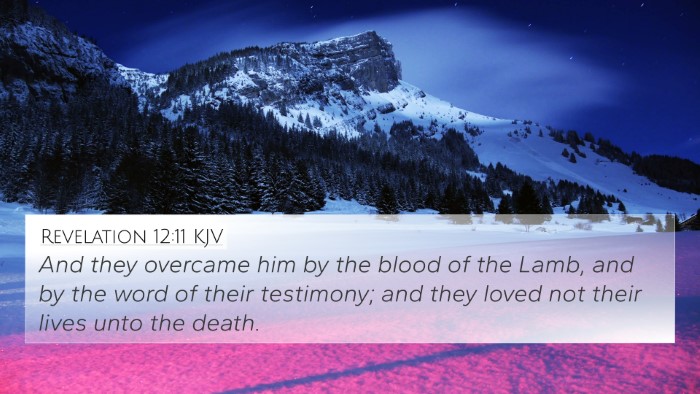Understanding Judges 5:18
Judges 5:18 reads: "Zebulun was a people that jeopardized their lives unto the death, and Naphtali, upon the high places of the field."
This verse reflects on the bravery and commitment of the tribes of Zebulun and Naphtali during the battle against Sisera, highlighting their willingness to risk everything for the cause of Israel. The context sheds light on the significance of their actions within the larger narrative of deliverance in the Book of Judges.
Key Themes and Insights
-
Courage and Sacrifice:
Biblical scholars like Matthew Henry emphasize the courage shown by Zebulun and Naphtali, suggesting their actions were not driven by greed or a desire for fame but a deep commitment to their people. They placed their lives on the line, which serves as a model of selfless bravery.
-
The Role of Tribal Identity:
Albert Barnes notes the importance of tribal identity in Israel's history, where these tribes acted not just as individuals but as members of a collective whose loyalty and faith led to victory. This encourages a sense of unity and purpose among believers today.
-
Divine Providence:
Scholar Adam Clarke discusses how their willingness to engage in battle reflects a belief in divine providence. Their actions were seen as part of a greater plan, aligning their faith with God's will, which is an essential concept in Biblical narratives.
Cross-References and Connections
To understand Judges 5:18 fully, it is beneficial to explore several cross-referenced biblical texts that relate to its themes. These connections can enhance our understanding of courage, sacrifice, and divine support in the face of adversity.
-
Hebrews 11:32-34: This passage highlights the faith of several individuals, including those who fought valiantly. It shows the legacy of bravery in the Old Testament, directly relating to the valiant acts of Zebulun and Naphtali.
-
1 Chronicles 12:33: This verse describes the warriors of Zebulun, emphasizing their skill in battle and unity, connecting to the themes of commitment found in Judges 5:18.
-
Isaiah 9:1-2: This prophecy mentions Zebulun and Naphtali, indicating their critical role in the prophecy concerning the Messiah. Such verses link the Old Testament narrative directly to New Testament revelation.
-
Psalm 44:5-7: The psalmist speaks of victories achieved through God's power, akin to the deliverance celebrated in Deborah's song. The thematic connection to reliance on God’s strength can deepen the interpretation of Judges 5:18.
-
Matthew 4:13-16: This New Testament verse directly references Jesus' ministry in the territories of Zebulun and Naphtali, providing a link between the Old Testament courage and the New Testament fulfillment of prophecy.
-
Joshua 19:10-16: These verses describe the allocation of land to the tribes of Zebulun and Naphtali, establishing their territorial identity and significance in the broader Israelite community.
-
Philippians 1:27: Paul encourages unity among believers, reflecting the collective spirit shown by Zebulun and Naphtali during their time of crisis. This application illustrates contemporary principles of faith and community.
Comparative Bible Verse Analysis
Understanding Judges 5:18 through cross-referencing exposes us to a rich dialogue between various biblical texts. When we engage in cross-referencing Bible study, we notice how biblical authors frequently reference previous texts and themes, revealing a continuous narrative of faith, sacrifice, and divine support.
Tools for Bible Cross-Referencing
Utilizing tools such as a Bible concordance, Bible cross-reference guide, and various Bible reference resources can enhance our study of Judges 5:18 and similar verses. These tools assist in discovering biblical themes and connecting scriptures across the Old and New Testaments.
Final Thoughts
In conclusion, Judges 5:18 serves as a powerful reminder of the values of courage, sacrifice, and faithfulness within the biblical narrative. Through exploring this verse's meaning and connections with other scriptures, we gain a deeper appreciation of the biblical text's richness and how we might apply its truths in our own lives.

